
Ask the Experts: Sales Tax Concerns for Small Online Sellers
Contents
Now that ecommerce businesses have closed the door on a turbulent year, sellers are staring “sales tax season” right in its ugly eye.The truth is, staying on top of the latest economic nexus and sales tax laws can be a tall order for even the savviest online retailers and accounting professionals. But for smaller businesses, the increasingly complex, constantly changing legislation introduces a unique set of headaches.
We feel your pain. In our recent webinar, “Sales Tax Concerns for Small Ecommerce Businesses,” Webgility’s own Laura Herscher chatted with a panel of ecommerce, tax, finance, and technology experts. In a lively discussion, they covered the most common sales tax concerns, the best way for online retailers to educate themselves on the latest legislation, and how to leverage technology in a collaborative relationship with your accounting professionals to stay compliant.
Tune in to hear insights from…
- Brad Scott, Director of Finance at Halstead Bead, Inc: Brad handles jewelry wholesaler Halstead Bead‘s multi-state sales and income tax registrations, filings, reconciliations, and other accounting needs. He also leads Halstead’s legislative advocacy efforts to achieve multi-state sales tax uniformity and simplification.
- Alex Oxford, Founder of TaxValet: Alex and his team at TaxValet oversee 12,000+ sales and use tax returns every year, eliminating the hassle and risk for ecommerce and software companies.
- Veronica Wasek, CPA: Veronica is the CEO and Founder of VM Wasek – a firm specialized in accounting and consulting for Shopify & Amazon sellers. She runs the 5 Minute Bookkeeping YouTube channel, blog, and Facebook community, and also operates an online academy for bookkeepers and accountants,
- Soon-Chul Choi, CPA: Soon-Chul is the Chief Operating Officer at Webgility, where he manages the SaaS company’s financial systems and reporting by combining his 15+ years of industry experience with accounting software automation across multiple applications.
If you joined us for the webinar, great! You can skip ahead to the end, where the panelists answered attendee questions they didn’t get to address during our scheduled time together. If you missed it, you’re in luck—we have sales tax advice straight from the experts.
What are the unique sales tax concerns for ecommerce businesses?
Alex Oxford: There are quite a few that ecommerce businesses need to keep in mind. Before we can talk about the unique challenges, I just want to start with a high-level overview of sales tax. Every business needs to pay sales tax in a state if they have sales tax nexus, and nexus is just a legal phrase that means that you have a sufficient presence in a state, you need to begin collecting and remitting there.
Now there’s a number of ways that you can get sales tax nexus in a state. The most common way is having a physical presence. However, the unique challenge for ecommerce businesses are two:
- The first is having a physical presence through inventory. So this could be storing your inventory in an Amazon FBA warehouse, using a 3PL, or opening up your own warehouse.
- And the second is crossing economic nexus thresholds. Economic nexus thresholds are new, this is what came out in 2018. And this is what you might hear referred to as the Wayfair case. And it’s one of the biggest, most instrumental developments in the sales tax space that directly impacts ecommerce businesses. This is where even if you don’t have a physical presence in a state, if you cross certain sales or transaction-count thresholds—typically $100,000 in sales, or 200 transactions—you now have to begin collecting and remitting sales tax.
So it’s very easy for a small ecommerce business to, almost overnight, have sales tax nexus and to need to begin getting sales tax permits in a handful of states when you might not even realize it…and you’re just based in maybe out of your home in Kentucky, or anywhere really.
How have U.S. tax laws changed in the last three years, and how is that impacting online sellers?
Brad Scott: It’s not a U.S. tax law change. It was something that came about because of the Supreme Court case in June of 2018, South Dakota v Wayfair. And basically what that did was it threw away the physical presence standard and gave us the nexus standard. And really, more importantly, small businesses now have to be cognizant of state and local sales tax regulations across all the states in the country.
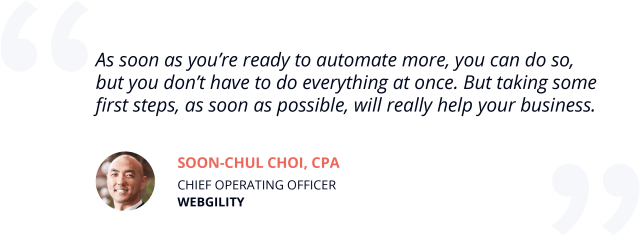
Small ecommerce businesses typically operate at a single location or a few locations around the country. And they become very familiar with their state and local tax requirements within those locations. But it’s not common that we have to think about what’s going on in the state next door or, you know, five states across the country. And Wayfair basically told us unless Congress wants to intervene and limit the ability of states to reach beyond their own borders, we now have to be cognizant of what’s going on in all these other states.
There are currently 45 states that have state sales tax. Alaska has municipal tax, but they don’t have a state sales tax. And so what you end up with is 46 different states, the District of Columbia, the outlying regions like Puerto Rico and American Samoa, that you’ve got to pay attention to and know what their tax rules are. And so calling this a U.S. tax law change kind of glosses over the fact that it’s actually 50 different states that you have to pay attention to.
What’s more, though Wayfair initially was just about sales tax, states are now using it to lever their way into gross receipts tax, income tax, consumer protection, consumer privacy, and more. Even beyond that, foreign countries are now using that precedent through the OECD to implement taxes and regulations across international borders as well. So small businesses are now facing a lot more criteria that we have to pay attention to than we did prior to the Wayfair case.
How far ahead should small businesses begin preparing for tax season?
Brad Scott: “Tax season” is no longer a real thing. The reality is that sales tax is an ongoing requirement. Most states have a monthly filing requirement, and a few have a quarterly filing requirement. Some only have an annual filing requirement, but that’s pretty infrequent. And so if you want to boil down your requirements to just a single period over the year, you’re going to be missing out on a lot of what’s going on in sales tax. So it’s expanded beyond those months and many small businesses use TaxValet services for a lot of those days, because it’s so much to keep track of.
Alex Oxford: For tax professionals, people assume you’re probably really busy with the April deadline for taxes. They’re busy in April, and January, and May, every month of the year. But when should businesses be thinking about this, and how should they be thinking about the flow of work? Realistically, a lot of ecommerce and small businesses don’t think about it until they’re thinking about income tax. That does their business a disservice, and it could pose a risk to their business.
Any business can have nexus in any state if they cross the economic nexus threshold, or if they somehow have a physical presence in the state. So this is a rolling requirement. If you hire a contractor and employee sales reps, you start storing inventory, you open a showroom or an office space, at that point, you need to start thinking: Do I need to get a permit in the state? And similarly, if you have a huge spike in sales, let’s say Christmas, it might be a good time right afterward to do an economic nexus analysis to see how your situation has changed.
Check in at least once a year to see how your nexus footprint has changed. Do you have nexus in more states than you did before? You don’t want a liability just growing within the business. Where you can really get in trouble is if you have a nexus for one year and two years and three years, then you might wake up one day and have a really bad day. It’s like going to your doctor and just having your regular checkup. If you miss it, you might have a bad day a few years from now.
What role should accounting professionals play in terms of keeping ecommerce businesses abreast of the latest sales tax laws?
Veronica Wasek: Accounting professionals may not always deal with sales tax, but there are few people that actually are sales tax specialists. Rather than running away from sales taxes, which is what a lot of accounting professionals want to do—with good reason—they educate themselves about the general rules that are affecting clients.
Ultimately accounting professionals are on the front lines for clients and need to be able to see when there is risk, that maybe they do need that nexus analysis once a year. They need to then bring someone into this financial team for the client who can handle the sales taxes. So though not every accountant does the sales taxes, they educate themselves and learn more about them.
Soon-Chul Choi: When we’re thinking about sales tax, you not only have the sales tax piece, but then you need to have the financial records to support sales tax and a potential audit. And so that’s where accounting professionals really come into play. It can help make sure ecommerce sellers have all the proper accounting records and documentation should that sales tax notice come in the mail.
Alex Oxford: If you run an ecommerce business, and you know that you’re looking for sales tax help, and you have a CPA or you have an accountant or bookkeeper, that’s the first resource that you should turn to. Using that last analogy of a primary care doctor, go talk to them first, but have an open and honest conversation. Ask, “Are you comfortable with taking this on? Can I lean on you for my sales tax support?” And with that, there’s a couple of areas that you should really dive into: “Hey, are you going to be responsible for monitoring my nexus situation? And what are we going to do to monitor that continuously? Are you comfortable with researching product taxability rules to help me understand if my products or services are even taxable in the states that I’m selling? Are you going to be handling all the filings and payments? Are you just going to be setting me up with technology and I’m going to be managing it myself? And if there’s an audit, are you going to be comfortable taking care of that for me?”
Most issues arise when the accounting professional says, “Oh, sure, we’ll take care of your sales tax,” but they don’t really define what that means. And then one or two years later, there’s an issue, there’s an audit, something’s messed up. And if the business owner had been just a little intentional by making sure that they’re fully aware of what relationship they’re entering into, they could avoid this headache later on.
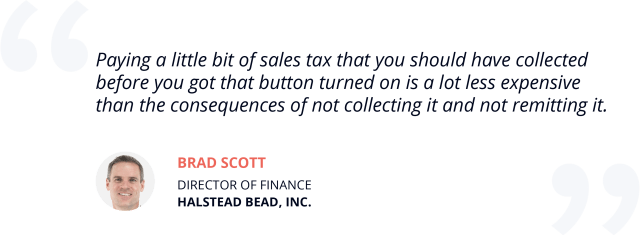
Veronica Wasek: There are some very well-intentioned accounting professionals that don’t understand all the rules and the value of bringing in that tax expert. And sometimes my clients will come to me and say, “Oh, my CPA told me I have to register in all the states, and they’re all over the country to file for sales taxes,” and no, that’s not good advice. That would be completely overwhelming. I can see why online sellers are so confused because there’s so much misinformation. Ultimately, it’s about knowing what to ask, so that then you can find the right person to work with.
Where can small businesses really go for more information and to stay up to date on this?
Brad Scott: There isn’t really a national resource that you can go to, no one place that you can go to get all of the information you need, which is why you really do need professional help. You can research the Department of Revenue websites, the regulatory statutes for all of the sales tax states years ago, but the problem is that the project is never ending. As state legislators go into session, the rules change. So every single time you end up at the end of the legislation season in any state, you’ve got to get back in there and find out if they’ve made changes.
Small ecommerce businesses need a firm that specializes in doing that research for you unless you have a team of internal people that’s helping you do it yourself. It comes back to looking for that professional pool of resources that you can draw from. As mentioned earlier, that local CPA may not have that level of familiarity. Your local tax attorney may not have it either. And for a small business owner, that’s kind of a tough pill to swallow, because you’re used to being independent.
Alex Oxford: There’s a spectrum of information and resources going from the most specific and the most detailed but the least helpful, all the way to the most helpful but maybe the least accurate. So the most detailed, it’s like the law of the land is going to be turning to the statutes, actually looking at the written law, the written text. That’s really challenging, even for tax professionals, and sometimes it’s very fuzzy and very difficult to understand.
The Department of Revenue’s websites have FAQ documents, and they have other resources that they’ve put out there. These are generally a lot easier to understand. But sometimes it’s inconsistent with the written law. So how would this play out in an audit? Beyond that, sellers can turn to resources that have been put together by sales tax experts, software companies, or professional service firms. TaxValet has an economic nexus guide, a U.S. sales tax guide for ecommerce businesses. If it’s put together by an expert, that’s great.
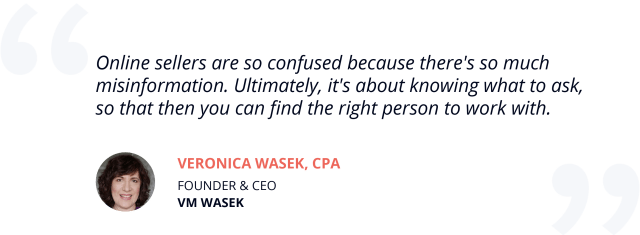
The last place to get sales tax advice is from the online communities and forums, the Amazon seller groups, the ecommerce groups where you’re hearing about what other business owners think. Historically, the business owners perpetuate information that is more like what they want to hear or what they want to believe. But it’s not true, unfortunately, and this is where dangerous ideas come from. Because you might hear, “Oh, I don’t have to worry about it,” and adopt that mentality. Ten years from now, it could be real bad.
We don’t have a centralized resource for the entire United States. However, the Streamlined Sales Tax Group is a great resource, at least for understanding product taxability definitions. If you’re selling supplements, clothing, software, digital products, the definitions are real gnarly, and they vary on a state-by-state basis. The SST has standardized definitions. So I think there’s 26 member states, all of these states share the same definition, you can just pull that up and find out, What’s the nexus threshold? What’s going to trigger nexus? Is this product taxable? That gets you about half way there at least.
How can small ecommerce businesses really leverage technology to make the sales tax process and their overall accounting process easier for them?
Soon-Chul Choi: When thinking about automation, think about your goals and what you’re trying to achieve: how to save time, and how to deploy financial and human resources. Additionally, look at the transaction and record-keeping accuracy. And look for a solution to help achieve stronger sales tax compliance and a defense against potential audits.
But additionally, you have the aspect of those who are tax-exempt. So when you’re checking out a customer during the sales process, there are some nonprofits who are tax exempt as well. You want to make sure that they have the best experience possible. By leveraging automation and technology, you can improve in those areas.
More specifically about how to utilize accounting software and technology, when you look at your general ledger transactions, your cash banking and credit card transactions, and receivable and credit card transactions, inventory management is very important, especially as the whole purpose of this webinar is about ecommerce selling. That’s very important to try to automate and improve the accuracy there. And finally, your accounts payable—as many bill payments as possible that you’re able to do online and leverage automation for will save you a lot of time.

Veronica Wasek: There are a lot of tools and apps that can save you a lot of time. But sellers sometimes think they just have to automate and won’t have to do any of it. And so keep in mind also that it is not only about bringing together the right apps, but it’s about putting together a financial system. And it still needs attention. Either you have to give it attention or you need to hire someone to do that for you. Because automation doesn’t mean it’s all done for you completely. There are still things that you have to do to maintain your finances.
How should online retailers be collaborating with their accounting professionals to keep their books organized and make the most out of these automation tools we’re talking about?
Veronica Wasek: It’s really about putting together all of the different pieces of the puzzle to then set up an effective financial process. You can definitely work with a professional to help you do that, but you have to keep in mind that there are many accountants now who are also technology advisors. They’re not crunching numbers and doing data entry anymore. Many are more modern accountants, and very well versed in the different technologies and integrations that we need to bring in into your accounting to streamline the inventory, the payroll receipts, capture, accounts payable, etc.
Sellers should start with setting up their books by making a decision on which accounting software to use, whether it’s QuickBooks Online, Pro, Premier, or Enterprise. Look at streamlining your chart of accounts, because it’s really the foundation of your accounting system and how you will categorize all of your transactions. And then select those automation tools for how are you going to bring in all of the different sales and the components of sales from your different sales channels into your books, or how are you going to reconcile all of your income with the payments received from your payment processors.
It’s also really important, as an online seller, for you to decide: Will you be doing the books? Is that something that is the best use of your time, or do you need to outsource that to a professional? Again, remember that automation doesn’t mean set it and forget it. You have to still put time and effort into your books. And that’s why it’s important for you to decide when is the right time for you to outsource that, and to work with a professional.
Soon-Chul Choi: There’s so many different parts of your business that you can automate. If you try to do everything at once, it can be very overwhelming. Small business owners are encouraged when they’re working with their CPA firms to identify: What are some possible quick wins? What can we get automated first? As soon as you’re ready to automate more, you can do so, but you don’t have to do everything at once. But taking some first steps, as soon as possible, will really help your business.
Alex Oxford: The most important automation piece for businesses is the tax calculation component and making sure that your products are set up to calculate the tax at checkout. If you don’t do that, then the filings almost don’t matter, because you won’t have the money to pay it.
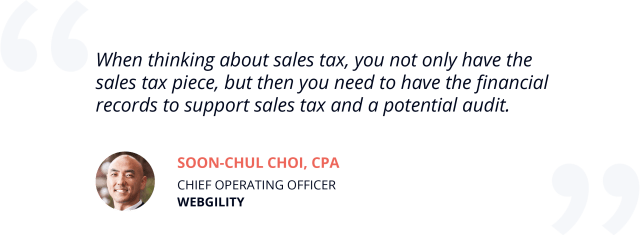
What is the number one mistake ecommerce businesses make when it comes to preparing or filing their sales taxes?
Alex Oxford: The biggest mistake is creating assumptions about whether they do or don’t have nexus, and that’s before they’re even doing the sales tax filings. Businesses just assume they don’t have to worry about paying sales tax in other states. And that’s a huge problem. When it comes to actually doing the sales tax returns or getting set up, the biggest mistake is setting up the tax calculation settings incorrectly, so that they’re not collecting the right amount of tax from customers. And so they’re not paying the right amount to the states.
Brad Scott: To look at the question more broadly, a lot of companies that are distributors, wholesalers, manufacturers that deal in business-to-business transactions that are accustomed to dealing with sales tax, think that it doesn’t apply to them. Wayfair is also frequently discussed in terms of it being an online issue when, in fact, it’s really an interstate commerce issue. So it doesn’t matter if you’re online or not, it doesn’t matter if you’re making retail transactions or not, you still have to be aware of these new rules and regulations. And then you have to make a risk assessment as to how heavily you want to engage if you are going to be filing $0 returns across the country. In some states, you’re not going to be penalized for that. But in other states, if you’re not filing those, you’re still going to face penalties and interest that piles up over the years. Assuming that this is really just for taxable transactions and retailers is kind of short- shifting the overall conversation, and you’ve got to acknowledge the fact that even if you’re not dealing in taxable transactions, you need to be paying attention to this.
Alex Oxford: And for wholesalers assuming that all of the transactions are going to be exempt, which, unfortunately in the tax world, you’re guilty until proven innocent, and so if you do B2B resale transactions, you’ve got to collect the exemption certificates. And that’s the number-one mistake that wholesalers make. They’re not collecting and verifying this.
What responsibility do 3PL sellers have from a sales tax perspective on Amazon?
Alex Oxford: Basically, it depends. If you are only selling on Amazon or only selling on marketplaces, and you don’t have your own website, then overall your sales tax liability and your sales tax exposure is going to be miniscule. Here’s why: Shortly after Wayfair, we saw states roll out marketplace facilitator laws, which force the marketplaces like Amazon, eBay, and Etsy to begin collecting and remitting sales tax on behalf of your sales. Now, if you’re storing inventory in Amazon’s warehouse, that’s going to give you the business sales tax nexus in that state. However, oftentimes, in the majority of states, if you’re only selling on an Amazon or a marketplace, then the marketplace is going to be handling the sales tax, so you don’t have any liability.

Now, the big question here is, if you’re only selling on a marketplace, and the marketplace is facilitating the tax, and you don’t actually owe anything, do you need to get a permit? This is where some states have provided clarity. Other states have not, and so this is where it gets into the gray. A lot of states have said, “If you’re only selling on marketplaces, we don’t want you to get a permit, because you’re going to be submitting filings that are for $0 every single month.” Other states have said, “We don’t care if you’re only selling on marketplaces, we want you to submit a return to tell us about those exempt sales.” And then other states have not provided any guidance.
Almost every single state in the country is a marketplace facilitator state. And so if you’re only a marketplace seller, you’re more likely than not going to not have substantial liabilities. But if you start selling on your own website, you sell on Shopify, WooCommerce, Magento, or another platform, wherever that sales tax nexus from the FBA inventory, or the 3PL is going to cross-contaminate your direct-to-consumer sales, and now you have to begin worrying about collecting sales tax on those transactions.
Is there a minimum for internet sales that the government has set for charging for sales taxes?
Brad Scott: There’s no good answer to that question, because it depends on the state that they’re there. We don’t even know the real number. There are an estimated 12,000 taxing jurisdictions across the country, and whether or not you have to collect tax depends on whether or not you’ve met that state’s threshold. There are a lot of different things that you have to be aware of and there is no simple answer. It goes back to finding the professional help and trying to do that. Trying on your own is a surefire way to bury yourself in state regulations that you’ll never get out of, you may never understand.
Alex Oxford: A lot of businesses that are new to this have misconceptions that the sales tax rate they should be using for the entire country is wherever they’re shipping from, but don’t assume you’re going to be using one rate for all of your transactions.

Do businesses only have to start collecting sales taxes when they pass the economic nexus threshold?
Alex Oxford: Nexus is like a light switch. It’s either on or off, and there’s a lot of ways you can turn it on: physical presence, economic nexus, affiliate relationships, owning other businesses selling similar products, etc.
If you’re moving toward hitting an economic nexus threshold, how far in advance should you get prepared to collect and remit sales taxes?
Veronica Wasek: It depends on your sales channels and accounting system. Then look at the other systems you might need. The most important thing is to be able to collect that sales tax, and then you can look at whether you’ll use a professional to help file those sales taxes or use software.
Alex Oxford: The biggest hurdle for businesses getting set up with sales tax is getting that calculation component figured out. Depending on the complexity of the situation, it could be a one-day turnaround or a six month implementation. Once you figure out one state, it’s generally easier to get the other states figured out.
How long does it take for a state to get the permits processed? It depends on the state. Most of these economic nexus laws give you a grace period of 30-60 days to get registered, but when you register, you can backdate the registration to when you first had nexus. It’s not a huge deal as long as you’re collecting the tax and you’re going to pay it.
Do not turn on the tax collection, submit the registration, and not turn on the collection until the state processes it, because some states take three to four months, and nobody benefits from that. If you’ve submitted the application to the state, turn on tax collection that day.
Brad Scott: Paying a little bit of sales tax that you should have collected before you got that button turned on is a lot less expensive than the consequences of not collecting it and not remitting it.
When working with an accounting professional, what do ecommerce businesses need to bring?
Alex Oxford: Accounting professionals will want to know:
- Where do you currently have permits?
- What sort of issues are outstanding?
- Have any states contacted you?
- Are there any audits?
- What products are you selling?
- Where are you selling them?
- Are you using 3PLs or FBA warehouses?
Then, the accounting professionals will analyze all of your sales data, so you can pool the resources and determine where the transaction data is from the last two years.
Veronica Wasek: One thing to keep in mind is to count sales rather than the number of items being shipped, if you’re sending promotional products to influencers or partners.

And now for attendee questions we were unable to answer during the live webinar:
What is the best way to handle drop shipments? For example, if we receive one order for 50 tumblers with one tumbler shipping to someone in every state, how do we capture the sales tax for each state that we have a nexus in? Would we need to create different orders for each tumbler that is going to a state that we have a nexus in, or can we charge the sales tax for the state that the bill-to address is in?
Alex Oxford: Drop shipments can be particularly complex when it comes to sales tax. When we look at the taxability of a transaction, we are looking at where the item is being shipped to. For this reason, you will need to have each ship-to address listed as a separate transaction. You would only need to charge sales tax if you have sales tax nexus and have a permit. For drop shippers, it is very likely that you will need to get sales tax permits in more states than you have nexus in order to get certain exemption certificate documents. These exemption certificate documents are what allow you to purchase inventory tax-free from suppliers. You can learn more about sales tax for drop shippers in TaxValet’s blog post Where Should Dropshippers Get Sales Tax Permits?.
If you sell on multiple marketplaces (like your own site, Amazon, Walmart, Newegg) then do you track nexus triggers based on sales only on your own site, or across all channels?
Alex Oxford: When it comes to tracking economic nexus thresholds across multiple sales channels, you will need to look at all of your sales channels. However, some states allow you to exclude sales that are done on marketplaces, as well as exclude non-taxable sales. You can download TaxValet’s free economic nexus spreadsheet which includes all of these details on this page.
When you cross the economic threshold, are you now liable for that year’s taxes or for upcoming year’s taxes? When do you file with a state?
Alex Oxford: When you cross economic nexus thresholds, you are generally liable for sales tax on the next transaction. Some states have included “grace periods” in their laws to give you between 30 – 60 days to get registered (how nice of them!). TaxValet’s economic nexus spreadsheet (download that here) will tell you when you need to register once you cross each state’s economic nexus threshold.
What happens if you over-collect sales tax in one state for a period?
Alex Oxford: If you over-collect tax, you generally have two options: (1) You can refund the customer(s) the over-collected tax, or (2) you can remit the over-collected tax to the state on your next return. We do not recommend holding onto over-collected tax. This is something that can get you in big trouble during an audit because it would be seen as tax fraud.
What is the first thing to do when you receive a letter from the auditor of a state? For instance, if you did not register in time with the state even though the economic nexus had triggered a long time ago.
Alex Oxford: Take a shot of tequila! Just kidding. The very first thing you should do is ensure that the person starting the audit has the authority to start the audit in the first place. Sometimes, third-party firms are enlisted by states to handle audits and they don’t always have their “paperwork” in order. Questioning them on this can get them to back down. The second thing you should do is have an internal analysis to determine what your exposure levels are. You want to have all of your “ducks in a row” to understand the situation ahead of the auditor. The third thing you should do is identify one point of contact within your company to interact with the auditor, and to ensure you have commitments from the auditor regarding communication, meeting frequency etc. It is also a good idea to get the contact information of the auditor’s manager ahead of time, just in case there are any issues later on. As you can imagine, there is quite a bit that goes into sales tax audits. You may consider enlisting the help of a sales tax professional.
If we have a client that is based in Texas and places an order to ship merchandise to their location in Maine, do they pay Texas or Maine tax?
Alex Oxford: Sales tax will always be due on the ship-to address for out-of-state orders. So in this instance, you will collect Maine tax (assuming you have a sales tax permit, that is!).



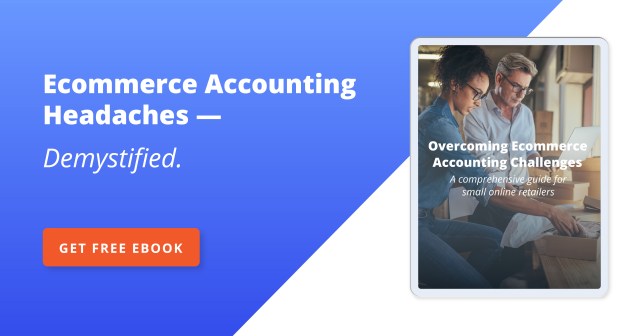

 The Webgility Team
The Webgility Team


